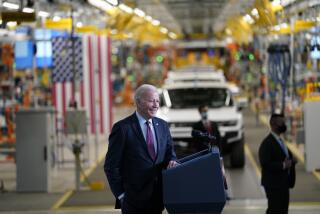Reagan to Let Quotas Expire on Car Imports : Won’t Ask New Japanese Curbs on Sales in U.S.: Ford, Chrysler Bitter
- Share via
WASHINGTON — Advocating “free and fair trade,” President Reagan announced Friday that he will not ask the Japanese government to continue voluntary restraints on automobiles exported to the United States when the quota program expires at the end of this month.
The President’s decision is expected to result in lower automobile prices for U.S. consumers, a larger share of the American small car market for the Japanese and the loss of thousands of jobs for American auto workers.
In a brief written statement, Reagan said that he hopes for “reciprocal treatment by Japan” on other trade matters--a reference to Japanese barriers to American exports of such goods as computers, telecommunications equipment, pharmaceuticals and forest products.
‘No Hidden Deals’
But Marlin Fitzwater, a White House spokesman who announced the President’s decision, said that “there are no hidden deals” with the Japanese--”no hints, no winks, no smiles.”
The auto industry, with the exception of General Motors, reacted bitterly to the President’s decision, which had been expected.
“This is a sad day for America--for American workers and American jobs,” said Chairman Lee A. Iacocca of Chrysler Corp. But, he added: “Chrysler is ready. We will play by these new rules and do whatever it takes to be competitive and profitable.”
Ford Motor Co. Chairman Donald E. Petersen lamented that Reagan’s decision “will create jobs in Japan at the expense of jobs for Americans workers.”
In contrast, General Motors, which plans to import nearly 300,000 small cars annually from Japan after the restraints are lifted, praised Reagan for acting “responsibly.” The GM statement agreed that “the time has come to return to free trade,” but it added that Japan should lift its barriers to U.S. exports.
‘A Severe Blow’
One of the harshest statements was made by United Auto Workers President Owen Bieber. He called Reagan’s action “a severe blow . . . especially to the 2.5 million Americans and their families whose livelihoods depend directly on a healthy (U.S.) auto sector.”
“No less than our middle-class standard of living is at stake as America’s best jobs are allowed to shift overseas,” Bieber added. “We have to question the competence of negotiators who are willing to add $5 billion to $7 billion to an already frightening trade deficit without securing any agreement from Japan to purchase more U.S. goods and services in return.”
But Fitzwater said that there were no negotiations this time with Japan--unlike four years ago, when the Administration strongly pressured Japan into “voluntarily” adopting quotas to give the American auto industry a competitive breathing spell in which to rebuild its battered finances and retool for a new generation of small, fuel-efficient vehicles.
Since 1981, Japan has limited its auto exports to the United States to 1.85 million each year and increased the proportion of higher priced models. In addition, the shortage of Japanese cars has enabled dealers to charge premiums. This has allowed American manufacturers to raise the prices of their vehicles, contributing to a record $10 billion in profits last year. The Federal Trade Commission estimated that consumers have been paying an extra $1.1 billion a year in higher auto prices--both domestic and Japanese--because of restraints on competition.
Rep. William E. Dannemeyer (R-Fullerton), saying that he is “delighted” with the President’s decision, estimated that the average price of a foreign car sold in the United States was $831 higher because of the Japanese export restrictions.
Nobody knows how many additional Japanese cars now will be shipped to U.S. dealers. Reagan’s special trade representative, William E. Brock, last week put the figure at 750,000 yearly. But Commerce Secretary Malcolm Baldrige estimated it at much less, around 400,000.
Likewise, predictions of the impact on American jobs have varied widely--from the loss of only a few thousand to 150,000 or more. Moreover, Fitzwater cited a Federal Trade Commission study that contended that, for each job protected by the Japanese restraints, there was a $240,000 loss to the American economy.
The operating theory within the Administration is that the Japanese still will keep a close eye on automobile exports to the United States and impose informal, voluntary restraints if necessary to prevent a dramatic surge in shipments. If the American auto industry and its jobs become too threatened, according to this theory, the result almost certainly will be renewed, determined efforts in Congress to pass protectionist legislation.
In his statement, Reagan said that he believes “in the wisdom of maintaining the principle of free and fair trade for the benefit of the world’s consumers. And I will continue to actively support further liberalization of the global trading system.
“In this context,” he continued, “it is my decision not to urge the Japanese to extend their voluntary export restraints on automobiles to the United States.”
The United States last year had a record $36.8-billion trade imbalance with Japan--part of a worldwide $123.3-billion U.S. trade deficit.







